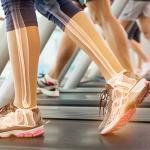How to manage weight, mood & perimenopausal symptoms through diet
Does HRT cause weight gain?
Spoiler alert – no it doesn’t! Women who take HRT may gain weight, although this is linked to the menopause and NOT the HRT itself. It is likely the weight gain would have occurred irrespective of HRT and not as a result of. The best way to minimise weight gain during the peri-menopause & menopause (irrespective of HRT) is to focus on a good level of protein in each meal (to maintain lean muscle mass), optimise gut health (to help with oestrogen recycling) and continue to exercise regularly (mood and metabolism boosting). Of course, slightly different techniques will work for each of us and so you need to find what works best for you as an individual.
Where do I start?!
For most women, aiming for 20-30g of protein per meal is a good start. This equates to 1 x piece or mackerel, salmon or a portion of tofu for example. Your protein intake should be spaced evenly throughout the day to improve overall absorption. Aim for 3 high protein meals and 1 or 2 high protein snacks per day. For most of us, it is breakfast and snacks where we tend to have a lower protein intake (1).
Weight gain in perimenopause and what can be done?
Weight gain is common during the perimenopause and weight distribution often changes, with a shift to a higher proportion of fat mass being held around the waist. Pairing exercise with the protein distribution outlined above, is a great starting point.
Weight and diet myths and facts
· MYTH: You need to cut your calories in half, juice cleanse or detox to prevent weight gain during the perimenopause.
· FACT: Following an overly restrictive diet will result in a larger reduction in muscle mass, reduced metabolism and increased food cravings (2). You will likely see a reduction in mood or even an increase in perimenopausal symptoms (3).
· MYTH: Food cannot reduce peri-menopausal symptoms
· FACT: Isoflavins, found in soy-based products, can independently reduce the frequency and severity of hot flushes in some women. They mimic the effects of oestrogen, effectively reducing the frequency and severity of hot flushes in some women. Include 2 x soy-based products per day and monitor your symptoms for 2-3 months
· MYTH: Weight gain is inevitable during the menopause
· FACT: Although it is common, not all women gain weight before or during the menopause. You do need to work harder to maintain your current weight during this time. There are a number of general techniques which can be used (outlined above) and more personalised ones which we can discuss in clinic!
Food and mood
Are you struggling with stress, anxiety or low mood? These can all be side effects of the menopause and peri-menopause. The good news is there are some simple dietary changes we can make to enhance mood, reduce stress and reduce anxiety. We know your gut bacteria are linked with mood via the vagus nerve, which connects the gut and brain, via the gut-brain-axis. Optimising your gut health and focusing on plant-based diversity within the diet can be helpful. Aim for 30 different plant-based products/week including wholegrains, beans/pulses, nuts/seeds, veggies and fruit. An anti-inflammatory diet and a Mediterranean style diet can also be effective and studies have shown the Mediterranean diet to be effective in reducing depressive episodes. Although diet shouldn’t replace medical treatment, it can certainly be an adjunctive therapy as a treatment method as well as being a fantastic preventative tool (5).
Exercise and mood
This is another great tool to improve mood, retain muscle mass and prevent weight regain if there has been weight loss. It has been noted as one of the most important factors in long-term weight loss.
Ideally you want to include some resistance exercise to help build/maintain muscles, however consistency is the most important factor so movement you enjoy and can enjoy frequently are the best options.
Gut-hormone-axis
The gut plays a huge role in the regulation of hormones. The “oestrobolome” is a set of gut bacteria (microbes) which help to regulate and metabolise oestrogen hormones and metabolites. The oestrobolome converts oestrogens into their active form, so they can enter the circulation and reach other tissues in the body, influencing all oestogen-dependent bodily functions. This means the gut (through the oestrobolome), by influencing circulating levels of estrogens, can affect bone mass, body weight, muscle mass, immune function and cardiovascular disease risk. Working on your gut health can have a huge positive impact upon your experience of the menopause and peri-menopause.
Take home
Diet can have a huge positive impact on weight, mood and perimenopausal symptoms. If you would like some more personalised advice, please do contact me!
References:
1. Schoenfeld, B.J. and Aragon, A.A. (2018). How much protein can the body use in a single meal for muscle-building? Implications for daily protein distribution. Journal of the International Society of Sports Nutrition, 15(1). doi:10.1186/s12970-018-0215-1.
2. Kalm, L.M. and Semba, R.D. (2005). They Starved So That Others Be Better Fed: Remembering Ancel Keys and the Minnesota Experiment. The Journal of Nutrition, [online] 135(6), pp.1347–1352. doi:10.1093/jn/135.6.1347.
3. Koo, S., Ahn, Y., Lim, J.-Y., Cho, J. and Park, H.-Y. (2017). Obesity associates with vasomotor symptoms in postmenopause but with physical symptoms in perimenopause: a cross-sectional study. BMC Women’s Health, 17(1). doi:10.1186/s12905-017-0487-7.
4. Chen, M-n., Lin, C-c. and Liu, C-f. (2014). Efficacy of phytoestrogens for menopausal symptoms: a meta-analysis and systematic review. Climacteric, [online] 18(2), pp.260–269. doi:10.3109/13697137.2014.966241.
5. Jacka, F.N., O’Neil, A., Opie, R., Itsiopoulos, C., Cotton, S., Mohebbi, M., Castle, D., Dash, S., Mihalopoulos, C., Chatterton, M.L., Brazionis, L., Dean, O.M., Hodge, A.M. and Berk, M. (2017). A randomised controlled trial of dietary improvement for adults with major depression (the ‘SMILES’ trial). BMC Medicine, [online] 15(1). doi:10.1186/s12916-017-0791-y.





